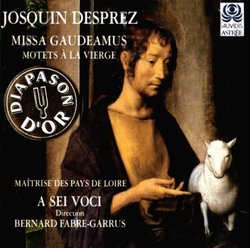| All Artists: Josquin Desprez, A Sei Voci, Orchestre Philharmonique de Pays de Loire, Anne-Kathleen La Combe, Beatrice Gobin, Celine Delanoe, Emmanuelle Bouyer, Helene Lecompte, Ludwig Rayer, Pierre Bonavia, Sophie Tourault, Thomas Robitaille, Vanessa Berrue Title: Josquin Desprez: Missa Gaudeamus/Motets Members Wishing: 0 Total Copies: 0 Label: Astree Release Date: 7/1/2003 Genre: Classical Styles: Opera & Classical Vocal, Historical Periods, Early Music Number of Discs: 1 SwapaCD Credits: 1 UPCs: 3298490086124, 822186086124, 329849008612 |
Search - Josquin Desprez, A Sei Voci, Orchestre Philharmonique de Pays de Loire :: Josquin Desprez: Missa Gaudeamus/Motets
 | Josquin Desprez, A Sei Voci, Orchestre Philharmonique de Pays de Loire Josquin Desprez: Missa Gaudeamus/Motets Genre: Classical
|
Larger Image |
CD Details |
CD ReviewsBetter Than Nothing? Not This Time! Giordano Bruno | Wherever I am, I am. | 03/25/2009 (3 out of 5 stars) "This is a dreadful performance, Diapason d'Or or nor! I reviewed it in another guise and criticized it roundly, but today I decided to give it a second chance. My opinion hasn't changed. If I heard a community chorus in Manitoba sing this way, I'd applaud like crazy, but as a 'professional' recording of a Josquin mass -- and the only recording of this Missa Gaudeamus -- it's a sorry disappointment.
A Sei Voci (six voices) has an uncanny way of sounding more like eighteen voices. That's not a compliment. What it implies is a roughness of ensemble, a lack of precision. On this CD, and others by the same consort, the lack of ensemble is exposed chiefly in the "attacks' (the initiation of notes - for singers, the consonants that initiate syllables of text). They're ragged. Even the professional male core of Sei Voci singers are ragged in their attacks; on this CD, the attacks are not crisp, while on their better CD of Josquin's Missa de Beata Vergine, their attacks are too brusque and sound like a series of surges. The unison plainchant of track 7, the "graduel", exposes the sloppiness of attacks very plainly. Their melismata (series of notes on a single vowel) are ragged also; on this CD, each singer has his own style of melisma, while on Beata Vergine, all of them are hooty, making the melismata sound like "he-he-he" or "wa-wa-wa." The use of the Children's Choir of the Loire might be delightful in a live concert, but the children don't really have the art of polyphony under enough control for a recording. Their rhythms are shaky and need to be 'cued' by a conductor. Their tuning is 'communal' rather than exact. Obviously six children on a single line can't be expected to be even as crisp in their attacks as the men. I know the Latin texts of the mass by heart, but on this CD I have a hard time following the words as language.The whole effect is a lack of compositional unity and an effect of laboring to stay close. Josquin should never sound labored or disjointed. "Gaudeamus" means "we celebrate." Does this murkiness sound celebratory? For a quick comparison, listen to the amazon MP3 samples for any Josquin mass sung by The Tallis Scholars, the Medieval Ensemble of London, or The Clerks' Group. There you'll hear that Josquin's music has "affect" as well as blaring pomp." |

 Track Listings (31) - Disc #1
Track Listings (31) - Disc #1